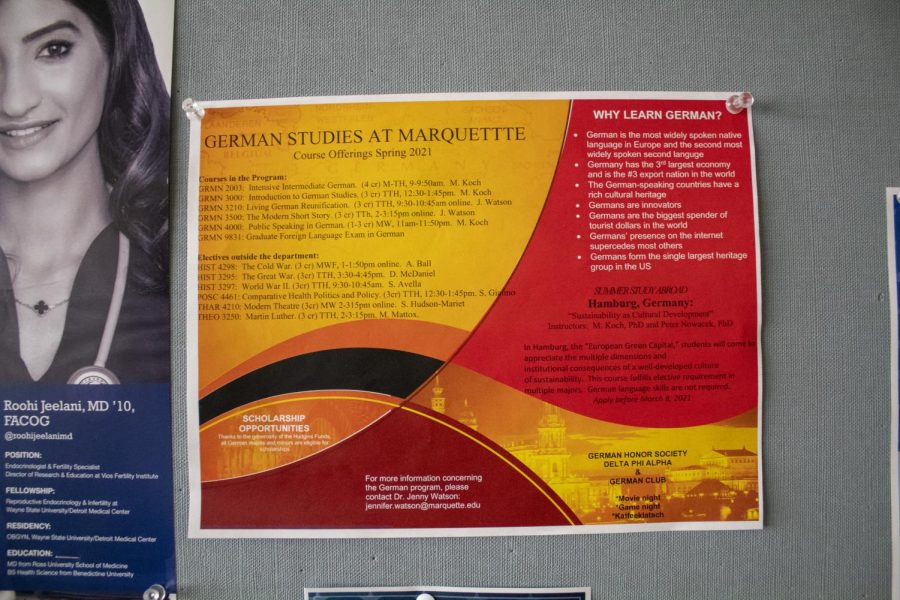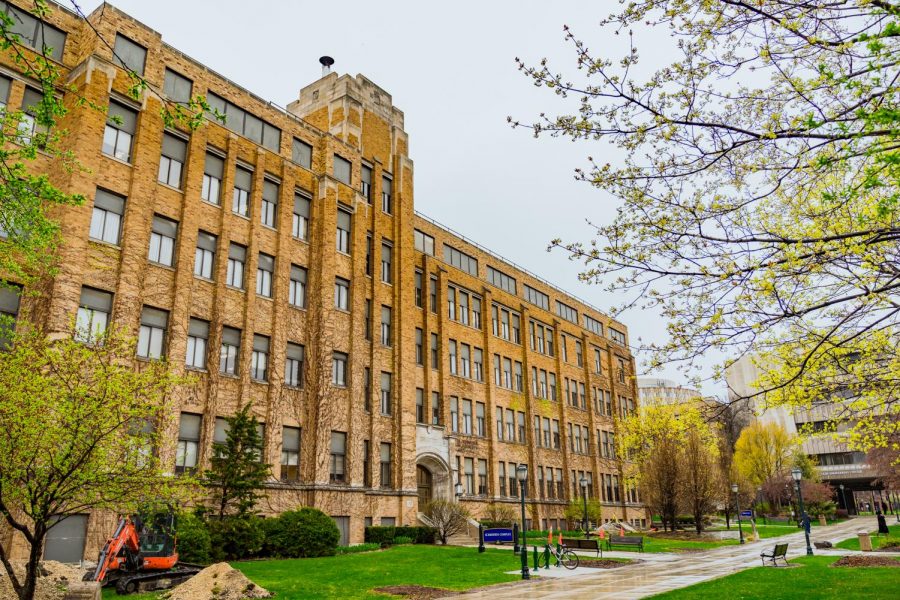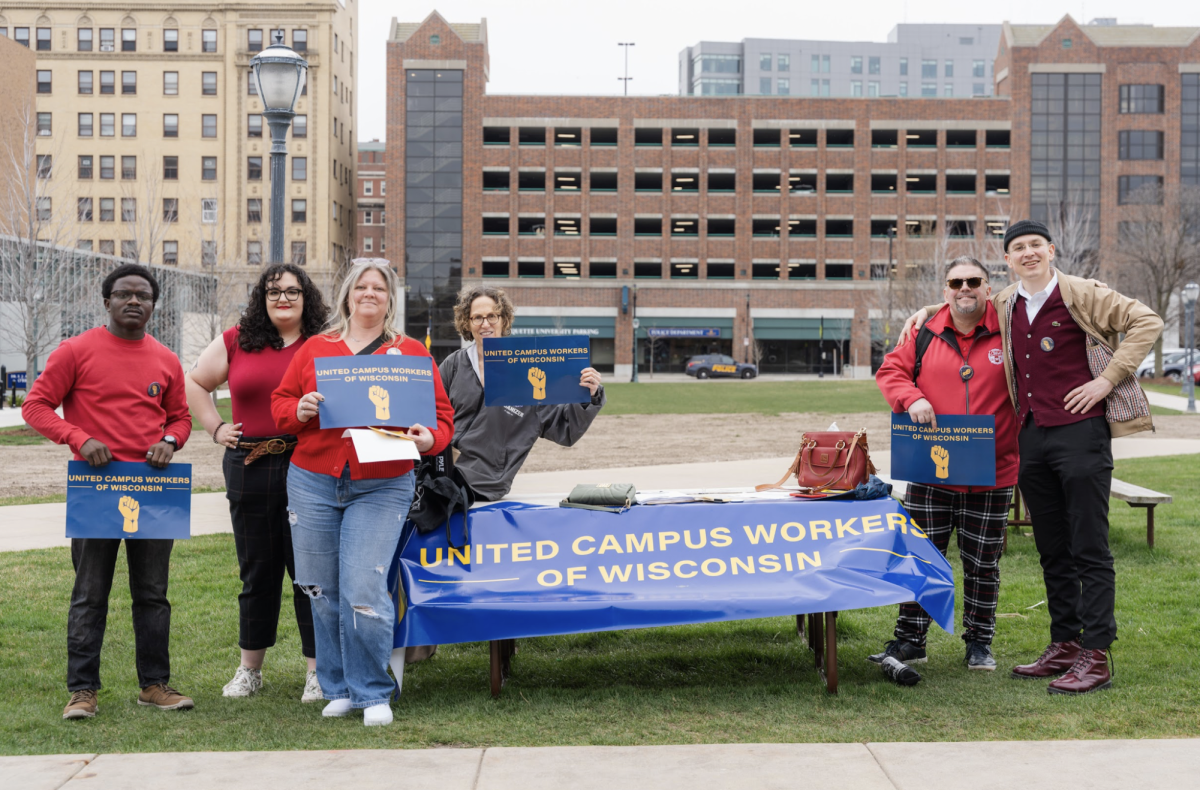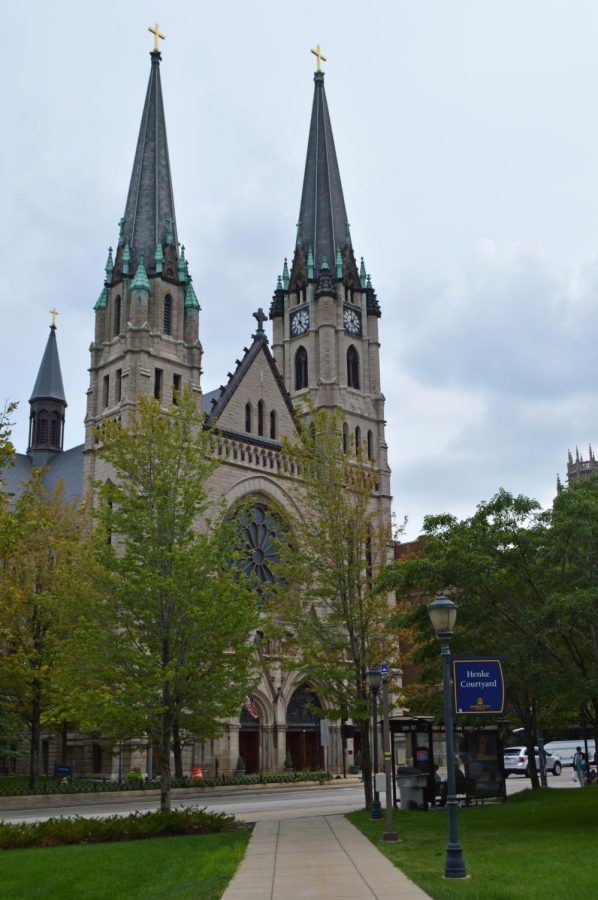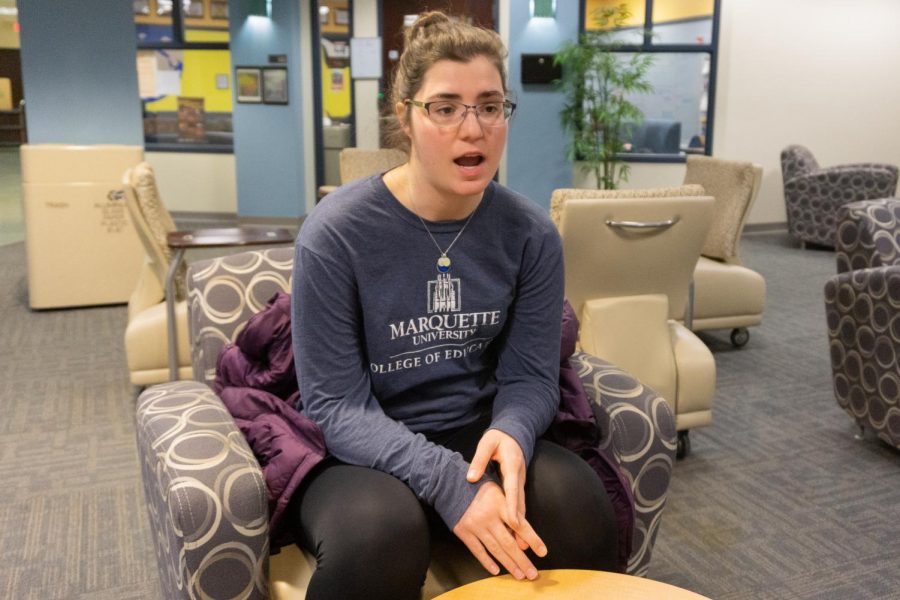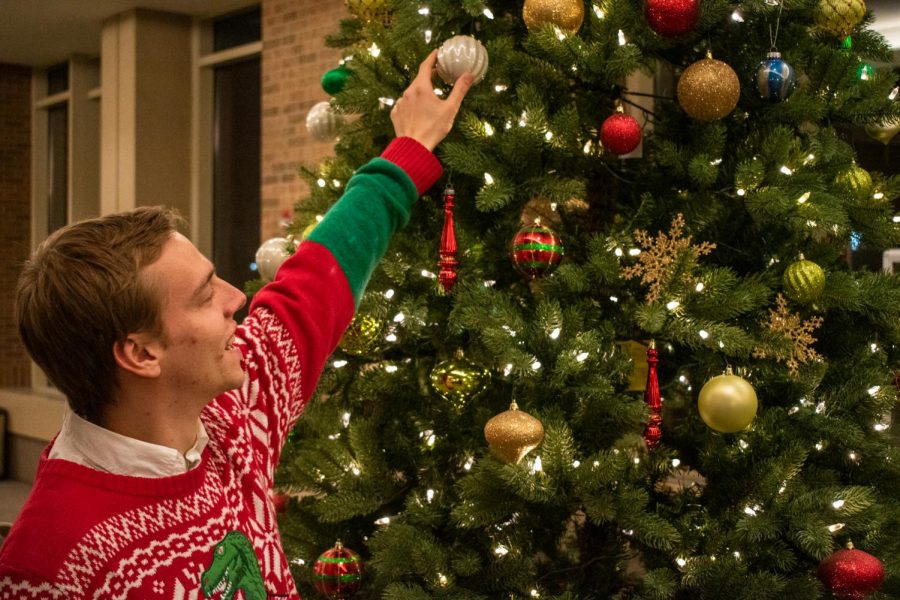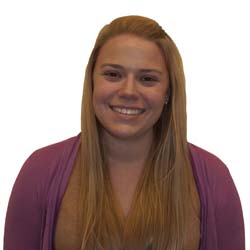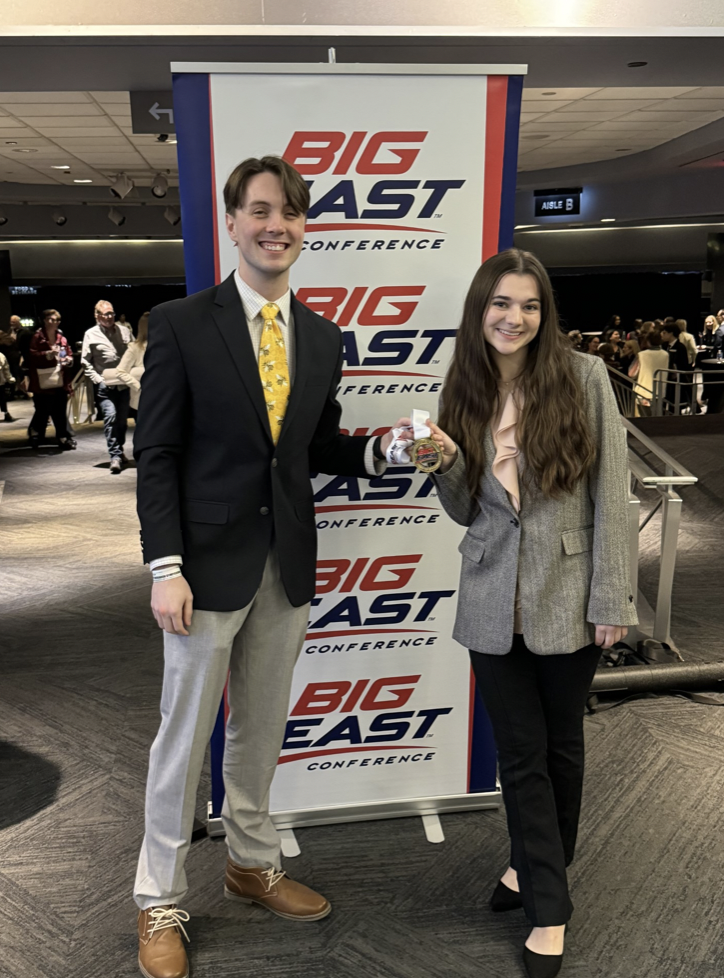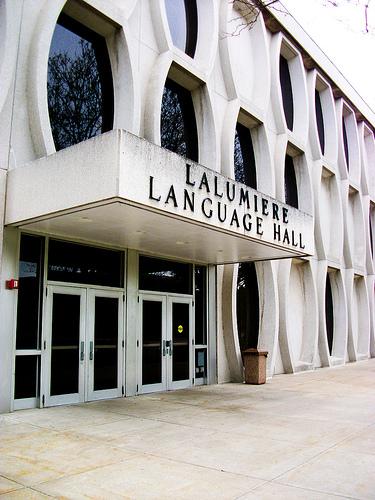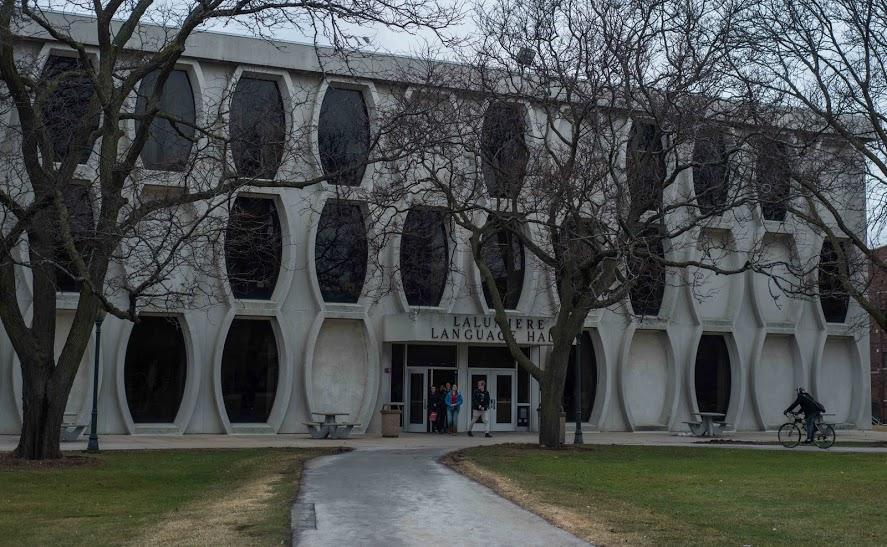Natalie Hill took a lot of risks to attend Marquette University.
Originally from Nashville, the 2017 graduate knew nobody at Marquette, as no one from her high school had ever attended. All Hill knew was the Jesuit mission and the challenge that Marquette could bring.
“I picked it because I felt like this is the school that is going to challenge me, this is the place I am going to grow,” Hill said. “I wanted to be in a place that values service and values thinking.”
Hill started in the College of Communication, then switched to the College of Education before finding her community within the College of Arts & Sciences. Hill majored in both history and French, where she said the professors within the college were her champions that not only encouraged her, but helped her find her way.
Many times at Marquette, Hill said she felt alone.
“Or that I had made a mistake or that I was failing or I wasn’t where I was supposed to be … having that community that was spearheaded by professors, it made it all the difference for me,” she said.
It showed Hill that there could be someone that is both a supportive and academic mentor, she said.
Yet, today, Hill said she would not be able to recommend Marquette in good faith to any high school senior, or those looking at colleges, specifically at Marquette.
“I feel like I’m being betrayed by my university, essentially,” Hill said.
UNPRECEDENTED TIMES
At the start of the spring 2021 academic semester, Marquette University President Michael Lovell announced the layoffs of 39 staff members due to short-and long-term financial challenges.
These positions were in part of the university addressing the Fiscal Year 2022 budget, which had included an initial 225-250 projection of faculty and staff being laid off, university spokesperson Kevin Conway, said. An incentivized retirement program and tenure buyouts were also in part of addressing the 2022 budget.
“The standard contract renewal process for non-tenure-track faculty on one-year temporary contracts is currently underway, in line with previous years,” Conway said in an email. “Each year, contracts for non-tenure-track faculty are reviewed based on student enrollment levels and demand for courses. Last fall’s incoming class (Class of 2024) was 16% smaller than the previous year, making it the smallest class in more than two decades.”
According to the Office of Institutional Research and Analysis, 1,647 first-year students were enrolled at Marquette in fall 2020. In 2019, there was an incoming class of 1,974 students. In 2018, there were more than 2,000 first-year students enrolled.
As a result, there will be fewer class sections next year, reducing the number of contract renewals for non-tenure-track faculty, Conway said, though he said no additional layoffs are planned at this time.
“The effects of this smaller first-year class size will be felt beyond this year as the class moves through the university. Marquette is committed to keeping class sections small to support the student experience,” Conway said in an email.
At the turn of the semester, the German program in the College of Arts & Sciences felt those effects. One of their three faculty members retired. Each of the two faculty members that remain teach full course loads.
“I am teaching an overload without pay,” Jenny Watson, an associate German professor, said, meaning she is not getting paid enough to teach an overload of classes.
Since 2015, the languages department on campus has seen a drastic toll on its student enrollment because Marquette stopped requiring a language to be taken within the Marquette Core Curriculum, a decision that Eugenia Afinoguenova, chair of the Languages, Literatures and Cultures department, said that the department has never really recovered from.
“That to us meant that institutional support was withdrawn from languages,” Afinoguenova said.
Afinoguenova said that the department has seen better years and that there are several changes that happened beyond the department, but said the first change was the core.
In the previous university core, there was a category of diverse cultures, in which the languages and cultures were part of. At the same time, the College of Arts & Sciences language requirement used to bring in a steady flow of students throughout the department, resulting in some students having to take up to four semesters of a language or culture class. Then, the College withdrew the requirement.
In the Arts & Scienes, there is only one or two semesters worth a language for a bachelor’s of arts degree, but for a bachelor’s of science, there is zero credits required.
“It’s not like we need to mandate taking languages, what happens is that languages are usually a supporting major or minor, because in the United States, there are few jobs in the languages here,” Afinoguenova said. “We are here because the institute remains of interest.”
She said the languages department serves as a crucial factor for someone considering to come to Marquette, however, since languages are not the first major, it comes second, as the first major mandates a student’s course schedule.
With languages cut from the core, Afinoguenova said the department is ‘structurally vulnerable.’
“I don’t know how we can prosper and come back strong, without institutional support,” Afinoguenova said.
Heidi Bostic, dean of the College of Arts & Sciences, said there are no faculty layoffs planned and there have not been any faculty layoffs in Arts & Sciences.
“Our need to be increasingly good stewards of the university’s resources is affecting all units across campus,” Bostic said in an email. “At this point, there is not a particular effect on the department of Languages, Literatures and Cultures. The College of Arts & Sciences will work together with the department leadership to create a sustainable vision and plan for the future.”
Like many on campus, the languages department has been finding ways to continue on amid the university’s budget cuts and adjusting to online learning through the pandemic. Since the core requirement was withdrawn, language programs such as German, French and the Classics, like Greek and Latin, have been tasked with another responsibility to adhere to that sustainable plan for the future: revamp the program within 3-5 years.
“It’s almost like saying, ‘we aren’t going to cut you, but you’re going to fail anyway,'” Watson said.
GERMAN EXCELLENCE
Watson, an associate professor in the German program, has been assigned to increase enrollment back to the enrollment levels the German program was at when there was a language requirement in the core.
Years up until 2015 saw an enrollment number above 100 students, but as the requirement was taken from the core, that has slowly decreased. As of fall 2020, only 75 students were enrolled in German. According to the Goethe-Institut, the federal republic of Germany’s cultural institute that is active worldwide, an estimated 100,000 college-aged students are taking German as a foreign language.
Next year, Watson said that she and the visiting instructor in the German program will have an increased workload without an increase in pay or new courses to offer students.
Watson said she is tasked to revamp the program by herself, as the visiting instructor does not get paid to do that.
Revamping the program to attract more students and have steady enrollment is an undertaking that Watson said she is worried she may not have time for. Watson said she has research to do, and would like to get promoted, but in order to receive a promotion, she will need to publish this year. Yet she is taking time to outreach to the German community in Milwaukee and within the Midwest to receive support to start restructuring the program. All of which Watson said she does not have enough time for.
“We did get some really great support from the community here, because there’s a lot of German groups in Milwaukee and around Milwaukee,” Watson said.
As a gift from the Rudolf and Helga Kaden Memorial Fund at Deutscher Sprach-und Schulverein (DSSV) or the German Language and School Society of Wisconsin, a German Excellence Fund was established at Marquette. Additionally Kaden funds are to be paid by the Greater Milwaukee Foundation and funds will also be contributed by the DSSV.
“We’re super psyched,” Watson said. “Right now, every year it will only kind of spin-off $5-7,000 but we are hoping more people will contribute and that’ll get better.”
Watson said she would like the funds to be used to pay the visiting instructor to help revamp the program in addition to the instructor’s current salary, but said she was told no because the funds will eventually be used to pay the entirety of the instructor’s salary, rather than being directly paid by the university.
Bostic said the German Excellence Fund grew out of an existing fund that the donors gave permission to repurpose in order to broaden the range of activities that it can support.
“It’s an endowed fund, which means that only a very small amount each year is spendable income. We hope that the fund will continue to grow as more donors contribute,” Bostic said in an email.
Excellence funds may be used for a variety of purposes such as providing high-impact opportunities for students, like study abroad and undergraduate research, as well as hiring faculty to help cover classes and sponsoring events, like guest speakers, Bostic said in an email.
“Now we’re scrambling to see if we can get some more money, but it’s like a catch-22 … if we can’t get that enrollment up, we’re going to be cut. But we can’t use the money we have to work on getting that enrollment up …,” Watson said.
Watson said it’s frustrating.
“I don’t see that as German excellence,” Watson said in regards to the use of the funds. She said she sees it as continuing German, not improving the program.
Watson said the instructor is teaching courses to students who are paying tuition for those classes, and this spring the classes have met the 10 students or above cut off. She said she hopes the donors would want the money going toward improving the German program.
“I would prefer at this point to try to grow that fund, but use the money we have now to revamp the program so that we could continue with German in the future,” Watson said.
In December, the German program lost its tenured professor to retirement. Because of the loss, Afinoguenova and Watson said they thought of developing a new course, a study abroad program or bringing a visiting teaching assistant from Germany to Marquette.
“This would be perfect use for the donors’ money,” Afinoguenova said in an email. “Yet the funding will be used for paying a small part of the salary of the part-time non-tenure track faculty member.”
Due to the fund not spinning off much, Afinguenova said she asks the funds to pay the instructor to help create new courses in order to meet the 3-5 year timeline.
Bostic said the College of Arts & Sciences is currently launching a strategic planning process with the department of Languages, Literatures and Cultures. She said it is in part a response to the collaborative work group process during fall in which LLAC was asked to think about ways to controls costs and increase enrollments in some programs seeing lower student demand.
“We have not yet discussed a timeline for this strategic planning process and its outcomes,” Bostic said.
Michael Koch, the visiting instructor of German, has been teaching at Marquette since 2015. He said Marquette was a dream destination for him. Koch was approached by the recently retired professor, who had reached out in hopes Koch would join Marquette upon the departure of his predecessor.
“This is wonderful, this is where I want to be,” Koch said, reflecting back on the time. “It’s much closer to our home, it’s a bigger department, great colleagues, great tradition, powerful foundation and I was raised Catholic.”
Koch said it is disheartening to see that all of his positive hopes, dreams and aspirations are being endangered by what he considers “short term misappropriation” and short-sightedness on the side of the administration.
“Foreign languages and the humanities are probably the most cost efficient and effective and far reaching, not just far reaching but depth reaching, in ways to educate young people,” Koch said. “Not only in practical terms in 21st century skills, but also in terms of, it’s become almost a catchword these days, the Catholic, Jesuit mission of Marquette.”
He said there are some things in life that should not just be measured by cost-efficiency.
“Even taking out the cost efficiency aspect of our work, the nature of our courses opening and broadening student’s horizons and confronting them with different values systems and customs, I think our work is invaluable,” Koch said.
Koch said foreign language classrooms tend to have small enrollment and it is a place where incoming students get to know one another and display a certain level of vulnerability by making mistakes in front of one another and collaborating in spite of that.
German, Koch said, is the language of the future, as Germany has sophisticated engineering, advanced manufacturing practices, sustainability, renewable sources of engineering, comprehensive transportation systems and is the anchor of the European Union.
Lily Wieringa, a senior in the College of Arts & Sciences, majors in political science and has a minor in German and art. She started taking German classes her first year on campus and continued since, calling it the “best decision” she has ever made.
Wieringa now is the president of the German Club on campus, leading roughly 10 students in exploring the German heritage of Milwaukee, reading and translating short stories in the language aloud and offering a support group to those taking German and who may need help with an assignment.
“I’ve made some of my closest friends that I’ve had at Marquette, and some of them have graduated and … we’ve been busy or fell out of touch, but to me, they’re the most vibrant personalities I think,” Wieringa said. “I don’t think I would know these people if we didn’t have a German department. All these different majors, or areas of campus, or commuters or people from all over … I feel like I’d be lacking if I didn’t know them, I can’t imagine if I didn’t know them.”
Wieringa said it should be Marquette’s mission to preserve the languages. Over time, Wieringa said she has seen the German professors become more stressed.
“The decisions that the university may be making seem so nonsensical,” Koch said. “In that they’re hurting themselves, they’re hurting the institution and they’re hurting the mission, if they were to carry these decisions through.”
FINDING SUPPORT
Collective action is important, Sonia Barnes, an associate professor of Spanish, said.
“We have many allies on campus who are speaking up in defense of languages,” Barnes said.
Letters and emails have been sent to Marquette’s administration, as well as a number of demonstrations and sit-ins outside of Zilber Hall have been enacted to show faculty and staff stand in solidarity that “no one gets fired.” This Wednesday, a social distanced rally will take place outside of Zilber Hall to ‘stop the layoffs’ and to ‘reinstate our staff.’
For Laura Matthew, an associate professor of history, she said her biggest concern would be taking away student’s opportunities to engage in a variety of different languages, as she said variation is important.
“We know that the languages that are less popular are immediately threatened. We know that,” Matthew said. “Some of those languages are taught by some faculty who have been at this university for decades and who have been extraordinarily important to students, and they are even more important as mentors because there are so few of them, and I think it’s criminal.”
Matthew said she does not see the cost savings coming from the languages department.
“This is a drop in the budget bucket to eliminate these programs. They are not going to be significant cost savings to the university … What it is going to do is take away the possibilities of future Marquette Students to follow their chosen courses of study and have the possibility to take languages that may not be the most popular, but are still very important for global education,” Matthew said.
Barnes said she does not understand why languages are being looked at separately, and not as one program.
“It’s super important that students get a diversity of languages to choose from,” Barnes said. “We want to form, that’s what our administrators say, we want to form global leaders. How are we going to form global leaders without a strong languages offering? We don’t want to weaken that in any of the languages.”
Watson said in order to revamp the German program, it is important to know what students desire and what they want to do.
Afinoguenova said that though the languages department has been met with challenges and receives support from faculty and staff across the university, it is still important that the languages department receives structural and institutional support.
“We are not victims, we have strategies,” Afinoguenova said.
MOVING FORWARD
Now a high school world geography and culture teacher in Chicago, Hill reflected on her time within the College of Arts & Sciences.
“My experience in Arts & Sciences helped me want to develop my love for studies and developing my own kind of philosophy of how I want to work with students,” Hill said.
She said she became the person that Marquette wants every student to be: a person for others.
Yet, as she reflects on her time at Marquette, she can’t help but feel disappointed in how the university has moved forward.
“It just seems like there has just been a continued drainage or almost kind of, like a shrinkage of the types of opportunities and support that the College of Arts & Sciences is given,” she said.
Hill said it could be because every piece of news she sees or every conversation she has with alumni, is about a contribution to the College of Engineering, Business Administration or the athletics department.
“I guess those things have really caste a shadow on the College of Arts & Sciences … every single student has to enroll and take a class in the College of Arts & Sciences and it is given a sliver of financial support or even a spotlight to showcase the university, which is ridiculous,” Hill said.
As a student, Hill said she felt the inequities between departments and programs on campus, and even now, she said she still feels them as an alumni. Hill said it is important that in order to follow cura personalis and lead as a Jesuit institution, decisions should not be for profitable gains, but should be balanced.
“Just because you can’t feature something in a hand out because it doesn’t look as nice as a student working on robotics, doesn’t mean it’s not valuable,” Hill said. “It’s valuable in a different way.”
Overall, Hill said the university she once knew, now feels completely foreign.
This story was written by Natallie St. Onge. She can be reached at natallie.stonge@marquette.edu.

